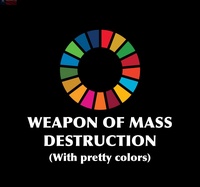Počinje stroga kontrola interneta?!?!?
Page 1 of 4
Page 1 of 4 • 1, 2, 3, 4 
 Počinje stroga kontrola interneta?!?!?
Počinje stroga kontrola interneta?!?!?
[size=31]The Final Leaked "Secret" TPP Text is All That We Feared. Top Down Control of the Internet
[/size]2015-10-14 0:40
By Jeremy Malcolm | globalresearch.ca

Since we now have the agreed text, we’ll be including some paragraph references that you can cross-reference for yourself—but be aware that some of them contain placeholders like “x” that may change in the cleaned-up text.
Also, our analysis here is limited to the copyright and Internet-related provisions of the chapter, but analyses of the impacts of other parts of the chapter have been published by Wikileaks and others.
Binding Rules for Rightsholders, Soft Guidelines for Users
If you skim the chapter without knowing what you’re looking for, it may come across as being quite balanced, including references to the need for IP rules to further the “mutual advantage of producers and users” (QQ.A.X), to “facilitate the diffusion of information” (QQ.A.Z), and recognizing the “importance of a rich and accessible public domain” (QQ.B.x). But that’s how it’s meant to look, and taking this at face value would be a big mistake.
If you dig deeper, you’ll notice that all of the provisions that recognize the rights of the public are non-binding, whereas almost everything that benefits rightsholders is binding. That paragraph on the public domain, for example, used to be much stronger in the first leaked draft, with specific obligations to identify, preserve and promote access to public domain material. All of that has now been lost in favor of a feeble, feel-good platitude that imposes no concrete obligations on the TPP parties whatsoever.
Another, and perhaps the most egregious example of this bias against users is the important provision on limitations and exceptions to copyright (QQ.G.17). In a pitifully ineffectual nod towards users, it suggests that parties “endeavor to achieve an appropriate balance in its copyright and related rights system,” but imposes no hard obligations for them to do so, nor even offers U.S.-style fair use as a template that they might follow. The fact that even big tech was ultimately unable to move the USTR on this issue speaks volumes about how utterly captured by Hollywood the agency is.
Expansion of Copyright Terms
Perhaps the biggest overall defeat for users is the extension of the copyright term to life plus 70 years (QQ.G.6), despite a broad consensus that this makes no economic sense, and simply amounts to a transfer of wealth from users to large, rights-holding corporations. The extension will make life more difficult for libraries and archives, for journalists, and for ordinary users seeking to make use of works from long-dead authors that rightfully belong in the public domain.
Could it have been worse? In fact, yes it could have; we were spared a 120 year copyright term for corporate works, as earlier drafts foreshadowed. In the end corporate works are to be protected for 70 years after publication or performance, or if they are not published within 25 years after they were created, for 70 years after their creation. This could make a big difference in practice. It means that the film Casablanca, probably protected in the United States until 2038, would already be in the public domain in other TPP countries, even under a life plus 70 year copyright term.
New to the latest text are the transition periods in Section J, which allow some countries a longer period for complying with some of their obligations, including copyright term. For example, Malaysia has been allowed two years to extend its copyright term to life plus 70 years. For Vietnam, the transition period is five years. New Zealand is the country receiving the most “generous” allowance; its term will increase to life plus 60 years initially, rising to the full life plus 70 year term within eight years. Yet Canada, on the other hand, has not been given any transition period at all.
Ban on Circumventing Digital Rights Management (DRM)
The provisions in QQ.G.10 that prohibit the circumvention of DRM or the supply of devices for doing so are little changed from earlier drafts, other than that the opposition of some countries to the most onerous provisions of those drafts was evidently to no avail. For example, Chile earlier opposed the provision that the offense of DRM circumvention is to be “independent of any infringement that might occur under the Party’s law on copyright and related rights,” yet the final text includes just that requirement.
The odd effect of this is that someone tinkering with a file or device that contains a copyrighted work can be made liable (criminally so, if wilfullness and a commercial motive can be shown), for doing so even when no copyright infringement is committed. Although the TPP text does allow countries to pass exceptions that allow DRM circumvention for non-infringing uses, such exceptions are not mandatory, as they ought to be.
The parties’ flexibility to allow DRM circumvention also requires them to consider whether rightsholders have already taken measures to allow those non-infringing uses to be made. This might mean that rightsholders will rely on the walled-garden sharing capabilities built in to their DRM systems, such as Ultraviolet, to oppose users being granted broader rights to circumvent DRM.
Alongside the prohibition on circumvention of DRM is a similar prohibition (QQ.G.13) on the removal of rights management information, with equivalent civil and criminal penalties. Since this offense is, once again, independent of the infringement of copyright, it could implicate a user who crops out an identifying watermark from an image, even if they are using that image for fair use purposes and even if they otherwise provide attribution of the original author by some other means.
The distribution of devices for decrypting encrypted satellite and cable signals is also separately proscribed (QQ.H.9), posing a further hazard to hackers wishing to experiment with or to repurpose broadcast media.
Criminal Enforcement and Civil Damages
On damages, the text (QQ.H.4) remains as bad as ever: rightsholders can submit “any legitimate measure of value” to a judicial authority for determination of damages, including the suggested retail price of infringing goods. Additionally, judges must have the power to order pre-established damages (at the rightsholder’s election), or additional damages, each of which may go beyond compensating the rightsholder for its actual loss, and thereby create a disproportionate chilling effect for users and innovators.
No exception to these damages provisions is made in cases where the rightsholder cannot be found after a diligent search, which puts the kibosh on ideas for the introduction of an orphan works regime that would cap remedies available against those who reproduce these otherwise-unavailable works.
One of the scariest parts of the TPP is that not only can you be made liable to fines and criminal penalties, but that any materials and implements used in the creation of infringing copies can also be destroyed (QQ.H.4(12)). The same applies to devices and products used for circumventing DRM or removing rights management information (QQ.H.4(17)). Because multi-use devices such as computers are used for a diverse range of purposes, this is once again a disproportionate penalty. This could lead to a family’s home computer becoming seized simply because of its use in sharing files online, or for ripping Blu-Ray movies to a media center.
In some cases (QQ.H.7), the penalties for copyright infringement can even include jail time. Traditionally, this has because the infringer is operating a business of commercial piracy. But under the TPP, any act of willful copyright infringement on a commercial scale renders the infringer liable to criminal penalties, even if they were not carried out for financial gain, provided that they have a substantial prejudicial impact on the rightsholder. The copying of films that are still playing in movie theaters is also subject to separate criminal penalties, regardless of the scale of the infringement.
Trade Secrets
The severity of the earlier language on trade secrets protection has not been abated in the final text. It continues to criminalize those who gain “unauthorized, willful access to a trade secret held in a computer system,” without any mandatory exception for cases where the information is accessed or disclosed in the public interest, such as by investigative journalists or whistleblowers.
There is no evident explanation for the differential treatment given to trade secrets accessed or misappropriated by means of a computer system, as opposed to by other means; but it is no surprise to find the U.S. pushing such a technophobic provision, which mirrors equivalent provisions of U.S. law that have been used to persecute hackers for offenses that would otherwise have been considered much more minor.
Top-Down Control of the Internet
ICANN, the global domain name authority, provoked a furore earlier this year over proposals that could limit the ability for owners of domain names to shield their personal information from copyright and trademark trolls, identity thieves, scammers and harassers.
The TPP has just ridden roughshod over that entire debate (at least for country-code top-level domains such as .us, .au and .jp), by cementing in place rules (QQ.C.12) that countries must provide “online public access to a reliable and accurate database of contact information concerning domain-name registrants.”
The same provision also requires countries to adopt an equivalent to ICANN’s flawed Uniform Domain-Name Dispute Resolution Policy (UDRP), despite the fact that this controversial policy is overdue for a formal review by ICANN, which might result in the significant revision of this policy. Where would this leave the TPP countries, that are locked in to upholding a UDRP-like policy for their own domains for the indefinite future?
The TPP’s prescription of rules for domain names completely disregards the fact that most country code domain registries have their own, open, community-driven processes for determining rules for managing domain name disputes. More than that, this top-down rulemaking on domain names is in direct contravention of the U.S. administration’s own firmly-stated commitment to uphold the multi-stakeholder model of Internet governance. Obviously, Internet users cannot trust the administration that it means what it says when it gives lip-service to multi-stakeholder governance—and that has ramifications that go even even deeper than this terrible TPP deal.
[/size]2015-10-14 0:40
By Jeremy Malcolm | globalresearch.ca

Since we now have the agreed text, we’ll be including some paragraph references that you can cross-reference for yourself—but be aware that some of them contain placeholders like “x” that may change in the cleaned-up text.
Also, our analysis here is limited to the copyright and Internet-related provisions of the chapter, but analyses of the impacts of other parts of the chapter have been published by Wikileaks and others.
Binding Rules for Rightsholders, Soft Guidelines for Users
If you skim the chapter without knowing what you’re looking for, it may come across as being quite balanced, including references to the need for IP rules to further the “mutual advantage of producers and users” (QQ.A.X), to “facilitate the diffusion of information” (QQ.A.Z), and recognizing the “importance of a rich and accessible public domain” (QQ.B.x). But that’s how it’s meant to look, and taking this at face value would be a big mistake.
If you dig deeper, you’ll notice that all of the provisions that recognize the rights of the public are non-binding, whereas almost everything that benefits rightsholders is binding. That paragraph on the public domain, for example, used to be much stronger in the first leaked draft, with specific obligations to identify, preserve and promote access to public domain material. All of that has now been lost in favor of a feeble, feel-good platitude that imposes no concrete obligations on the TPP parties whatsoever.
Another, and perhaps the most egregious example of this bias against users is the important provision on limitations and exceptions to copyright (QQ.G.17). In a pitifully ineffectual nod towards users, it suggests that parties “endeavor to achieve an appropriate balance in its copyright and related rights system,” but imposes no hard obligations for them to do so, nor even offers U.S.-style fair use as a template that they might follow. The fact that even big tech was ultimately unable to move the USTR on this issue speaks volumes about how utterly captured by Hollywood the agency is.
Expansion of Copyright Terms
Perhaps the biggest overall defeat for users is the extension of the copyright term to life plus 70 years (QQ.G.6), despite a broad consensus that this makes no economic sense, and simply amounts to a transfer of wealth from users to large, rights-holding corporations. The extension will make life more difficult for libraries and archives, for journalists, and for ordinary users seeking to make use of works from long-dead authors that rightfully belong in the public domain.
Could it have been worse? In fact, yes it could have; we were spared a 120 year copyright term for corporate works, as earlier drafts foreshadowed. In the end corporate works are to be protected for 70 years after publication or performance, or if they are not published within 25 years after they were created, for 70 years after their creation. This could make a big difference in practice. It means that the film Casablanca, probably protected in the United States until 2038, would already be in the public domain in other TPP countries, even under a life plus 70 year copyright term.
New to the latest text are the transition periods in Section J, which allow some countries a longer period for complying with some of their obligations, including copyright term. For example, Malaysia has been allowed two years to extend its copyright term to life plus 70 years. For Vietnam, the transition period is five years. New Zealand is the country receiving the most “generous” allowance; its term will increase to life plus 60 years initially, rising to the full life plus 70 year term within eight years. Yet Canada, on the other hand, has not been given any transition period at all.
Ban on Circumventing Digital Rights Management (DRM)
The provisions in QQ.G.10 that prohibit the circumvention of DRM or the supply of devices for doing so are little changed from earlier drafts, other than that the opposition of some countries to the most onerous provisions of those drafts was evidently to no avail. For example, Chile earlier opposed the provision that the offense of DRM circumvention is to be “independent of any infringement that might occur under the Party’s law on copyright and related rights,” yet the final text includes just that requirement.
The odd effect of this is that someone tinkering with a file or device that contains a copyrighted work can be made liable (criminally so, if wilfullness and a commercial motive can be shown), for doing so even when no copyright infringement is committed. Although the TPP text does allow countries to pass exceptions that allow DRM circumvention for non-infringing uses, such exceptions are not mandatory, as they ought to be.
The parties’ flexibility to allow DRM circumvention also requires them to consider whether rightsholders have already taken measures to allow those non-infringing uses to be made. This might mean that rightsholders will rely on the walled-garden sharing capabilities built in to their DRM systems, such as Ultraviolet, to oppose users being granted broader rights to circumvent DRM.
Alongside the prohibition on circumvention of DRM is a similar prohibition (QQ.G.13) on the removal of rights management information, with equivalent civil and criminal penalties. Since this offense is, once again, independent of the infringement of copyright, it could implicate a user who crops out an identifying watermark from an image, even if they are using that image for fair use purposes and even if they otherwise provide attribution of the original author by some other means.
The distribution of devices for decrypting encrypted satellite and cable signals is also separately proscribed (QQ.H.9), posing a further hazard to hackers wishing to experiment with or to repurpose broadcast media.
Criminal Enforcement and Civil Damages
On damages, the text (QQ.H.4) remains as bad as ever: rightsholders can submit “any legitimate measure of value” to a judicial authority for determination of damages, including the suggested retail price of infringing goods. Additionally, judges must have the power to order pre-established damages (at the rightsholder’s election), or additional damages, each of which may go beyond compensating the rightsholder for its actual loss, and thereby create a disproportionate chilling effect for users and innovators.
No exception to these damages provisions is made in cases where the rightsholder cannot be found after a diligent search, which puts the kibosh on ideas for the introduction of an orphan works regime that would cap remedies available against those who reproduce these otherwise-unavailable works.
One of the scariest parts of the TPP is that not only can you be made liable to fines and criminal penalties, but that any materials and implements used in the creation of infringing copies can also be destroyed (QQ.H.4(12)). The same applies to devices and products used for circumventing DRM or removing rights management information (QQ.H.4(17)). Because multi-use devices such as computers are used for a diverse range of purposes, this is once again a disproportionate penalty. This could lead to a family’s home computer becoming seized simply because of its use in sharing files online, or for ripping Blu-Ray movies to a media center.
In some cases (QQ.H.7), the penalties for copyright infringement can even include jail time. Traditionally, this has because the infringer is operating a business of commercial piracy. But under the TPP, any act of willful copyright infringement on a commercial scale renders the infringer liable to criminal penalties, even if they were not carried out for financial gain, provided that they have a substantial prejudicial impact on the rightsholder. The copying of films that are still playing in movie theaters is also subject to separate criminal penalties, regardless of the scale of the infringement.
Trade Secrets
The severity of the earlier language on trade secrets protection has not been abated in the final text. It continues to criminalize those who gain “unauthorized, willful access to a trade secret held in a computer system,” without any mandatory exception for cases where the information is accessed or disclosed in the public interest, such as by investigative journalists or whistleblowers.
There is no evident explanation for the differential treatment given to trade secrets accessed or misappropriated by means of a computer system, as opposed to by other means; but it is no surprise to find the U.S. pushing such a technophobic provision, which mirrors equivalent provisions of U.S. law that have been used to persecute hackers for offenses that would otherwise have been considered much more minor.
Top-Down Control of the Internet
ICANN, the global domain name authority, provoked a furore earlier this year over proposals that could limit the ability for owners of domain names to shield their personal information from copyright and trademark trolls, identity thieves, scammers and harassers.
The TPP has just ridden roughshod over that entire debate (at least for country-code top-level domains such as .us, .au and .jp), by cementing in place rules (QQ.C.12) that countries must provide “online public access to a reliable and accurate database of contact information concerning domain-name registrants.”
The same provision also requires countries to adopt an equivalent to ICANN’s flawed Uniform Domain-Name Dispute Resolution Policy (UDRP), despite the fact that this controversial policy is overdue for a formal review by ICANN, which might result in the significant revision of this policy. Where would this leave the TPP countries, that are locked in to upholding a UDRP-like policy for their own domains for the indefinite future?
The TPP’s prescription of rules for domain names completely disregards the fact that most country code domain registries have their own, open, community-driven processes for determining rules for managing domain name disputes. More than that, this top-down rulemaking on domain names is in direct contravention of the U.S. administration’s own firmly-stated commitment to uphold the multi-stakeholder model of Internet governance. Obviously, Internet users cannot trust the administration that it means what it says when it gives lip-service to multi-stakeholder governance—and that has ramifications that go even even deeper than this terrible TPP deal.

Kermit-

Posts : 26479
2014-04-17
 Re: Počinje stroga kontrola interneta?!?!?
Re: Počinje stroga kontrola interneta?!?!?
[size=36]TPP Treaty: Intellectual Property Rights Chapter - 5 October 2015[/size]
Today, 9 October, 2015 WikiLeaks releases the final negotiated text for the TPP (Trans-Pacific Partnership) Intellectual Property Rights Chapter. The TPP encompasses 12 nations representing more than 40 per cent of global GDP. Despite a final agreement, the text is still being withheld from the public, notably until after the Canadian election on October 19.
The document is dated four days ago, October 5th, or last Monday, the same day it was announced in Atlanta, Georgia that the 12 member states to the treaty had reached an accord after five and a half years of negotiations.
The IP Chapter of the TPP has perhaps been the most controversial chapter due to its wide-ranging effects on internet services, medicines, publishers, civil liberties and biological patents. “If TPP is ratified, people in the Pacific-Rim countries would have to live by the rules in this leaked text,” said Peter Maybarduk, Public Citizen’s Global Access to Medicines Program Director. “The new monopoly rights for big pharmaceutical firms would compromise access to medicines in TPP countries. The TPP would cost lives.”
Read the full press release.
View the leaked "TPP Treaty: Intellectual Property Rights Chapter, Consolidated Text" (PDF, HTML).
Today, 9 October, 2015 WikiLeaks releases the final negotiated text for the TPP (Trans-Pacific Partnership) Intellectual Property Rights Chapter. The TPP encompasses 12 nations representing more than 40 per cent of global GDP. Despite a final agreement, the text is still being withheld from the public, notably until after the Canadian election on October 19.
The document is dated four days ago, October 5th, or last Monday, the same day it was announced in Atlanta, Georgia that the 12 member states to the treaty had reached an accord after five and a half years of negotiations.
The IP Chapter of the TPP has perhaps been the most controversial chapter due to its wide-ranging effects on internet services, medicines, publishers, civil liberties and biological patents. “If TPP is ratified, people in the Pacific-Rim countries would have to live by the rules in this leaked text,” said Peter Maybarduk, Public Citizen’s Global Access to Medicines Program Director. “The new monopoly rights for big pharmaceutical firms would compromise access to medicines in TPP countries. The TPP would cost lives.”
Read the full press release.
View the leaked "TPP Treaty: Intellectual Property Rights Chapter, Consolidated Text" (PDF, HTML).

Kermit-

Posts : 26479
2014-04-17
 Re: Počinje stroga kontrola interneta?!?!?
Re: Počinje stroga kontrola interneta?!?!?
https://wikileaks.org/tpp-ip3/

Kermit-

Posts : 26479
2014-04-17
 Re: Počinje stroga kontrola interneta?!?!?
Re: Počinje stroga kontrola interneta?!?!?
Već sada elektronski mediji ukidaju komentare na članke.
Rekao samveć a ponovit ću. Evo u -Frankfurter Algeneine Zeitung-
više nema komentara,onemogućeni su. Prije misec dana sam
citirao neke komentare a bilo ih je 90% protiv vlade Merkel,
protiv sankcija Rusiji, protiv američke politike na BI a za suradnju
Njemačke i EU sa Rusijom.
Protiv tog transatlantskog ugovora sa Amerikom je 90%
Njemaca a virujem i svih drugih koji su imalo upućeni.
Rekao samveć a ponovit ću. Evo u -Frankfurter Algeneine Zeitung-
više nema komentara,onemogućeni su. Prije misec dana sam
citirao neke komentare a bilo ih je 90% protiv vlade Merkel,
protiv sankcija Rusiji, protiv američke politike na BI a za suradnju
Njemačke i EU sa Rusijom.
Protiv tog transatlantskog ugovora sa Amerikom je 90%
Njemaca a virujem i svih drugih koji su imalo upućeni.

Yehudi- Posts : 14715
2014-04-20
 Re: Počinje stroga kontrola interneta?!?!?
Re: Počinje stroga kontrola interneta?!?!?
bio je jedan članak u američkim novinama o masovnom ukidanju komentiuranja, te uvođenju zakona vezano za komentare na Twiteru i Fejsu koji "raspiruju mržnju, netrpeljivost i dr." katastrofaYehudi wrote:Već sada elektronski mediji ukidaju komentare na članke.
Rekao samveć a ponovit ću. Evo u -Frankfurter Algeneine Zeitung-
više nema komentara,onemogućeni su. Prije misec dana sam
citirao neke komentare a bilo ih je 90% protiv vlade Merkel,
protiv sankcija Rusiji, protiv američke politike na BI a za suradnju
Njemačke i EU sa Rusijom.
Protiv tog transatlantskog ugovora sa Amerikom je 90%
Njemaca a virujem i svih drugih koji su imalo upućeni.

Kermit-

Posts : 26479
2014-04-17
 Re: Počinje stroga kontrola interneta?!?!?
Re: Počinje stroga kontrola interneta?!?!?
Ma tzv. " zapad" je totalno u kurcu sa svojom politikom
tzv."demokracijom" (i uvodjenjem iste svuda di je nepotrebno
a di je potrebno -SA i sl- tamo ništa)
Evo uveli neke sankcije Belarusiji jer je Lukašenko dobio
izbore a svi strani promatrači nemaju primedbi na provedbu izbora.
Kao traže uvodjenje više demokracije pa udri sankcijama.....
A tek za ovo ispiranje mozga putem medija, nametanje njihovog
pogleda na Svijet, gušenje svake kritike pa to vodi jedino u
totalitarizam i diktaturu, policijsku mega državu. Strašno.
tzv."demokracijom" (i uvodjenjem iste svuda di je nepotrebno
a di je potrebno -SA i sl- tamo ništa)
Evo uveli neke sankcije Belarusiji jer je Lukašenko dobio
izbore a svi strani promatrači nemaju primedbi na provedbu izbora.
Kao traže uvodjenje više demokracije pa udri sankcijama.....
A tek za ovo ispiranje mozga putem medija, nametanje njihovog
pogleda na Svijet, gušenje svake kritike pa to vodi jedino u
totalitarizam i diktaturu, policijsku mega državu. Strašno.

Yehudi- Posts : 14715
2014-04-20
 Re: Počinje stroga kontrola interneta?!?!?
Re: Počinje stroga kontrola interneta?!?!?
Neshvatljivo je da "zapadne" vlade i dalje na silu guraju po svome
dok stanovništvo istih tih zemalja, koji se interesiraju i prate zbivanja,
velikom većinom podržava stajalište i djelovanja Rusije, ipak te
vlade i dalje rade protivno stavu i interesima svoga naroda.
Kakva crna " demokracija ", nitko narod ništa ne pita,
naprotiv još se pooštravaju cenzura i ispiranje mozga.
Više nema vijesti o kidanju glava, masovnim ubojstvima
civila, ratnim zločinima islamista, kulturocidima.........ma ništa,
ni slova. Naprotiv, madaovi i dalje sijeku glave, razapinju,ubijaju,
siluju, masakriraju.............."zapad" ih želi prikazati dobrima,
"djelomice umjerenima" i nastavlja otvoreno podržavati i
naoružavati -isis-......a Rusiju prikazati negativno, kao neprijatelja.
Ovaj "zapad" stvarno vode ludjaci.
dok stanovništvo istih tih zemalja, koji se interesiraju i prate zbivanja,
velikom većinom podržava stajalište i djelovanja Rusije, ipak te
vlade i dalje rade protivno stavu i interesima svoga naroda.
Kakva crna " demokracija ", nitko narod ništa ne pita,
naprotiv još se pooštravaju cenzura i ispiranje mozga.
Više nema vijesti o kidanju glava, masovnim ubojstvima
civila, ratnim zločinima islamista, kulturocidima.........ma ništa,
ni slova. Naprotiv, madaovi i dalje sijeku glave, razapinju,ubijaju,
siluju, masakriraju.............."zapad" ih želi prikazati dobrima,
"djelomice umjerenima" i nastavlja otvoreno podržavati i
naoružavati -isis-......a Rusiju prikazati negativno, kao neprijatelja.
Ovaj "zapad" stvarno vode ludjaci.

Yehudi- Posts : 14715
2014-04-20
 Re: Počinje stroga kontrola interneta?!?!?
Re: Počinje stroga kontrola interneta?!?!?
Marcelus se toliko trudi, piše i objavljuje po internetu samo zbog mene i Eve.
Nada se da ćemo bar ponešto od toga i mi pročitati.
Nada se da ćemo bar ponešto od toga i mi pročitati.

crvenkasti-

Posts : 29696
2014-04-17
 Re: Počinje stroga kontrola interneta?!?!?
Re: Počinje stroga kontrola interneta?!?!?
Ma je, ja sam mislio da je samo radi tebe.

Yehudi- Posts : 14715
2014-04-20
 Re: Počinje stroga kontrola interneta?!?!?
Re: Počinje stroga kontrola interneta?!?!?
Trpanje pod tepih ne pomaze. Ukidanje komentara je zadnji potez vladajucih da sami sebe pokusaju jos malo ubijediti da su svi za njih i njihove sulude ideje. Ti ljudi zive i zele da zive u imaginarnom svijetu, narkomani vlasti.

omni-

Posts : 7009
2014-04-12
Lokacija: : 9 krug
 Re: Počinje stroga kontrola interneta?!?!?
Re: Počinje stroga kontrola interneta?!?!?
Nemam vremena citat cijeli clanak,ali budem..samo bih rekla:pocinje?
:S
:S
_________________
“You will not be good teachers if you focus only on what you do and not upon who you are.”
― Rudolf Steiner

L'âme- Posts : 25744
2014-04-12
 Re: Počinje stroga kontrola interneta?!?!?
Re: Počinje stroga kontrola interneta?!?!?
omni wrote:Trpanje pod tepih ne pomaze. Ukidanje komentara je zadnji potez vladajucih da sami sebe pokusaju jos malo ubijediti da su svi za njih i njihove sulude ideje. Ti ljudi zive i zele da zive u imaginarnom svijetu, narkomani vlasti.
Liberali - fašisti 21. stoletja.

Stribor-

Posts : 1640
2015-09-22
 Re: Počinje stroga kontrola interneta?!?!?
Re: Počinje stroga kontrola interneta?!?!?
Dobro jutro. Demokracija nikad nije ni postojala. Barem ne u USA većini zapadne Europe. Izuzev par skandinavskih zemalja ali i oni su sad sjebani. Ne znam kako nazvati one koji su u to vjerovali? Naivčine? Budaletine?Yehudi wrote:Ma tzv. " zapad" je totalno u kurcu sa svojom politikom
tzv."demokracijom" (i uvodjenjem iste svuda di je nepotrebno
a di je potrebno -SA i sl- tamo ništa)
Evo uveli neke sankcije Belarusiji jer je Lukašenko dobio
izbore a svi strani promatrači nemaju primedbi na provedbu izbora.
Kao traže uvodjenje više demokracije pa udri sankcijama.....
A tek za ovo ispiranje mozga putem medija, nametanje njihovog
pogleda na Svijet, gušenje svake kritike pa to vodi jedino u
totalitarizam i diktaturu, policijsku mega državu. Strašno.


marcus-t- Posts : 1720
2015-10-07
 Re: Počinje stroga kontrola interneta?!?!?
Re: Počinje stroga kontrola interneta?!?!?
sloboda misljenja samo u intimi svog doma, vanka ima da mislite kako veliki brat kaze da treba.
Ideologija je iznad istine i slobode govora
Ideologija je iznad istine i slobode govora
_________________
It was always the women, and above all the young ones, who were the most bigotet adherents of the party, the swallowers of slogans, the amateur spies and nosers-out of unortodoxy.
Orwell 1984

prckov- Posts : 34555
2014-04-19
 Re: Počinje stroga kontrola interneta?!?!?
Re: Počinje stroga kontrola interneta?!?!?
Jbg, zalosno je to da je nacizam do sada bio najiskrenija ideologija, doduse dosta daleko od iskrenosti al u usporedbi sa drugim....

omni-

Posts : 7009
2014-04-12
Lokacija: : 9 krug
 Re: Počinje stroga kontrola interneta?!?!?
Re: Počinje stroga kontrola interneta?!?!?
treba k0ontrolirati internet da fašisti i nacisti nebi sijali sjeme svoje ideologije, antifašizam mora da predvlada

Guest- Guest
 Re: Počinje stroga kontrola interneta?!?!?
Re: Počinje stroga kontrola interneta?!?!?
Kontrola i kaznjavanje su nuzni.
Ima ovdje raznih placenika, novoliberalnih, pisu svasta.
Ima ovdje raznih placenika, novoliberalnih, pisu svasta.

dijagram-

Posts : 18912
2015-08-09
Page 1 of 4 • 1, 2, 3, 4 
 Similar topics
Similar topics» Prvi korak nakon najnovijeg napada: stroga kontrola interneta
» Njemačka uvela stroga ograničenja za migrante iz članica EU
» Znanje , odgovornost i kontrola
» Ozakonjena kontrola "sirenja netrpeljivosti"
» Glavni i osnovni cilj NSA je potpuna kontrola populacije
» Njemačka uvela stroga ograničenja za migrante iz članica EU
» Znanje , odgovornost i kontrola
» Ozakonjena kontrola "sirenja netrpeljivosti"
» Glavni i osnovni cilj NSA je potpuna kontrola populacije
Page 1 of 4
Permissions in this forum:
You cannot reply to topics in this forum
 Events
Events Latest images
Latest images
 by Kermit 14/10/2015, 07:09
by Kermit 14/10/2015, 07:09
